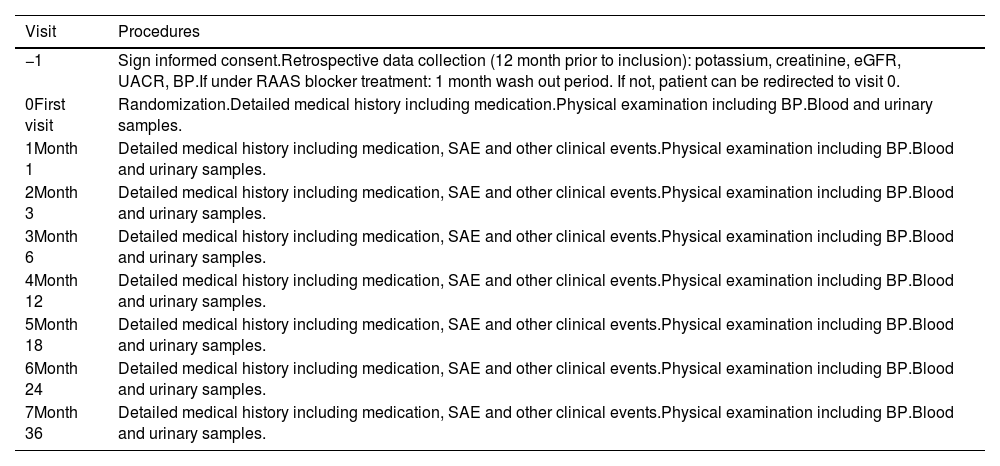Evidence about nefroprotective effect with RAAS blockers in elderly patients with chronic kidney disease (CKD) without proteinuria is lacking. The primary outcome of our study is to evaluate the impact of RAAS blockers in CKD progression in elderly patients without proteinuria.
Materials and methodsMulticenter open-label, randomized controlled clinical trial including patients over 65 year-old with hypertension and CKD stages 3–4 without proteinuria. Patients were randomized in a 1:1 ratio to either receive RAAS blockers or other antihypertensive drugs and were followed up for three years. Primary outcome is estimated glomerular filtration rate (eGFR) decline at 3 years. Secondary outcome measures include BP control, renal and cardiovascular events and mortality.
Results88 patients were included with a mean age of 77.9±6.1 years and a follow up period of 3 years: 40 were randomized to RAAS group and 48 to standard treatment. Ethiology of CKD was: 53 vascular, 16 interstitial and 19 of unknown ethiology. In the RAAS group eGFR slope during follow up was −4.3±1.1ml/min, whereas in the standard treatment group an increase on eGFR was observed after 3 years (+4.6±0.4ml/min), p=0.024. We found no differences in blood pressure control, number of antihypertensive drugs, albuminuria, potassium serum levels, incidence of cardiovascular events nor mortality during the follow up period.
ConclusionsIn elderly patients without diabetes nor cardiopathy and with non proteinuric CKD the use of RAAS blockers does not show a reduction in CKD progression.
The PROERCAN (PROgresión de Enfermedad Renal Crónica en ANcianos) trial (trial registration: NCT03195023).
Actualmente no existe suficiente evidencia sobre el efecto nefroprotector de los bloqueantes del sistema renina-angiotensina-aldosterona (BSRAA) en pacientes añosos con enfermedad renal crónica (ERC) sin proteinuria y sin cardiopatía. El objetivo es evaluar el efecto de los BSRAA en la progresión de la ERC en este grupo poblacional.
MétodosSe trata de un estudio prospectivo, aleatorizado, que compara la eficacia de los BSRAA vs. otros tratamientos antihipertensivos en la progresión renal en personas mayores de 65 años con ERC estadios 3 y 4 e índice albúmina/creatinina<30mg/g. Aleatorización 1:1 BSRAA o tratamiento antihipertensivo estándar. Se recogieron cifras tensionales y parámetros analíticos de un año previo a la aleatorización y durante el seguimiento.
ResultadosSe incluyeron 88 pacientes seguidos durante tres años con edad media de 77,9±6,1 años. De estos, se aleatorizaron 40 al grupo BSRAA y 48 al estándar. La etiología de ERC fue: 53 vascular, 16 intersticial y 19 no filiada. En el primer grupo se observó una progresión de la ERC con una caída del filtrado glomerular estimado (FGe) de -4,3±1,1mL/min, mientras que en el grupo estándar un aumento del FGe durante el seguimiento de 4,6±0,4mL/min, p=0,024. No se apreciaron diferencias entre ambos en el control tensional, el número de antihipertensivos, la albuminuria, los niveles de potasio, la incidencia de eventos cardiovasculares ni la mortalidad durante el seguimiento.
ConclusionesEn pacientes añosos no diabéticos con ERC no proteinúrica y sin cardiopatía el uso de BSRAA no añade beneficio en la progresión de la ERC.
Ensayo clínico Progresión de Enfermedad Renal Crónica en Ancianos (PROERCAN) (NCT03195023).











